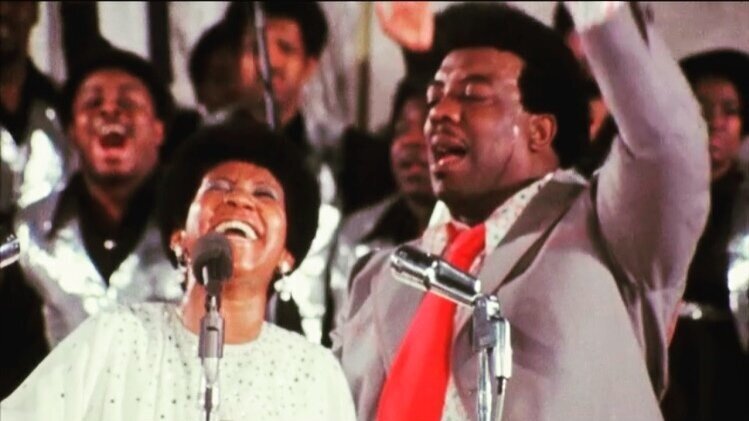Amazing Grace
A chance to see as well as to hear the performance that became a famous album.
Such is its nature that Amazing Grace calls for what is essentially a report rather than a review. In 1972 the famed singer Aretha Franklin, already acclaimed as the Queen of Soul, returned to her roots by recording an album of gospel songs. She was aware of the extent to which such music thrived on atmosphere and accordingly decided to bypass a studio setting and to have the recording made in a Baptist church in Los Angeles with a responsive audience in attendance. Her judgment was spot on for when the album came out it became the world's best-selling record of gospel music of all time.
By 1972, Sydney Pollack had established himself as a film director of quality and Warner Brothers arranged for him to film the recording sessions which were spread over two evenings. The fact that what was shot then is only reaching us now is down to two factors. First, there was a major mishap: when the footage came to be viewed, it was realised that the sound had not been properly synchronised and consequently Warner abandoned the project. Secondly - and rather mysteriously - when Alan Elliott came up with a corrected version in 2011 attempts to screen it were frustrated by objections from Franklin herself who twice took legal action to stop it. Thus it is that, following her death in August 2018, Amazing Grace reaches us at last and has already won huge acclaim.
Whatever issues Aretha Franklin had with the film, her fans will certainly welcome it since she comes over strongly on screen. Indeed, the film is a vivid testimony to her way with gospel songs and of value both on that level and as a study of the cultural significance of gospel music in America's black communities. Franklin is, of course, central, but she is introduced by the Rev. James Cleveland who also sings and stamps his own personality on the film, while the support by the Southern California Community Choir under Alexander Hamilton contributes substantially. With piano accompaniment more often by Cleveland than by Franklin herself and with instrumental backing on most numbers, the film is essentially a set of songs with only brief shots of preparation added. However, the star's father, the Rev. C.L. Franklin, pays tribute to her in a speech delivered on the second night and celebrities including Clara Ward and Mick Jagger are glimpsed in the audience. Perhaps unexpectedly 'Amazing Grace' itself, heard in a notably slow and idiosyncratic interpretation, comes at the end of the first night leaving it to a solo performance of 'Never Grow Old' to conclude the sessions the following evening.
As now rectified, Pollack's film comes across well, but its quality as cinema will hardly be the point. What counts here is that we have a close-up record of what for all admirers of Aretha Franklin and indeed of gospel music generally was a classic occasion.
MANSEL STIMPSON
Featuring Aretha Franklin, James Cleveland, C. L. Franklin, Alexander Hamilton, Bernard Pretty Purdie, Chuck Raisney, Clara Ward, Mick Jagger, Sydney Pollack, Charlie Watts.
Dir Alan Elliott and Sydney Pollack, Pro Joe Boyd, Alan Elliott, Rob Johnson, Chiemi Karasawa, Spike Lee, Sabrina V. Owens, Angie Seegers, Tirrell D.Whittley and Jospeh Woolf, Ed Jeff Buchanan.
40 Acres & A Mule Filmworks/Als.Records and Tapes/Rampant/Time-StudioCanal.
89 mins. USA. 2018. Rel: 10 May 2019. Cert. U.


